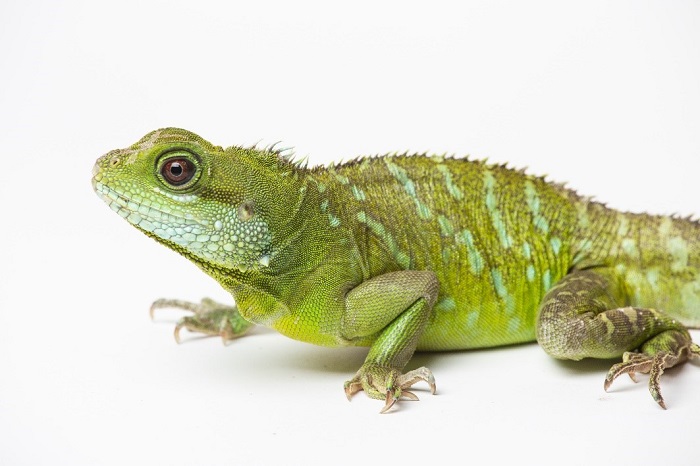Asian Water Dragon Dies at Smithsonian’s National Zoo
A 2-year-old female Asian water dragon who was the first documented birth by facultative parthenogenesis in her species died from blood cancer. Facultative parthenogenesis occurs when a female reproduces and contributes a healthy, thriving offspring to her species despite never breeding with a male or receiving genetic material. The median life expectancy for Asian water dragons is 10 to 15 years.
Around 1:30 p.m. June 14, Reptile Discovery Center keepers were conducting routine husbandry checks and noticed that the Asian water dragon was lethargic and appeared to have difficulty breathing. She was immediately transported to the Zoo’s veterinary hospital, where veterinarians administered fluids, oxygen, heat and antibiotics. Radiographs and an ultrasound did not indicate any remarkable or obvious cause for her decline. Despite receiving supportive treatment and care throughout the afternoon and evening, she was found deceased in her enclosure at 9:45 p.m.
The Asian water dragon hatched at the Reptile Discovery Center Aug. 24, 2016. At the time, keepers were studying fertility via sperm storage and parthenogenesis. Prior to the study, Reptile Discovery Center keepers discarded any eggs produced by the mother Asian water dragon per infertile egg protocol. Female water dragons and other members of the Agamid family have been documented laying infertile eggs if they have not bred with a male.
The water dragon’s mother laid three clutches of eggs between 2015 and 2016. After two weeks of incubating the first clutch of eggs, keepers candled them by holding each one up to a light. This process revealed veins, a telltale sign that the eggs were fertile and embryos were developing. Although the embryos in the first two clutches did not survive, they were fully developed inside the eggs. A breakthrough came with the third clutch, when this female hatchling emerged from her shell.
Keepers obtained a DNA swab from inside her cheek and sent it to scientists at the Smithsonian Conservation Biology Institute’s (SCBI) Center for Conservation Genomics, along with tissue and blood samples from previous embryos that had not developed to term. They found each offspring had only one gene copy, or allele, and it matched one of the two from the mother. The mother’s eggs were developing directly into offspring without contribution from a male. If egg and sperm fusion had occurred, the offspring would have two alleles.
Now that the parthenogenesis study has concluded, the animal care team will evaluate whether or not to incubate any future eggs laid by the mother. Animal keepers and SCBI scientists were hoping to see if the 2-year-old Asian water dragon offspring would be able to produce offspring of her own or with a future mate. Unfortunately, she died shortly before her species begins producing eggs—around 3 years of age. Her contribution to science—enabling Zoo and SCBI staff to confirm facultative parthenogenesis in Asian water dragons—made her an important ambassador for her species.
Asian water dragons—also called Thai, Chinese or green water dragons—are commonly found throughout their native habitats in Thailand, Vietnam, Cambodia, Laos, Myanmar and Southern China. This species sports a long, banded tail that is used for balance and leverage when climbing and as a whip-like defense against predators. Their moniker comes from another defense strategy; these lizards will enter the water and swim away from danger or submerge themselves completely. They can hold their breath for up to 25 minutes.
Although the Zoo’s 13-year-old mother Asian water dragon remains behind-the-scenes at the Reptile Discovery Center, Zoo visitors can meet a variety of lizards, tortoises, snakes and amphibians during the daily 11 a.m. and 3 p.m. keeper talks.
# # #
SI-290-2019
Jen Zoon
301-908-3102

